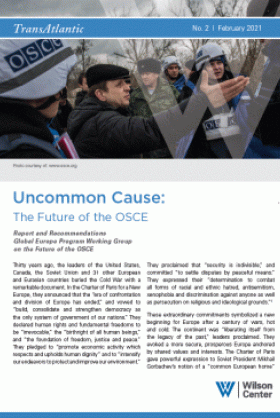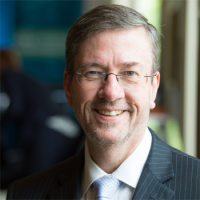Uncommon Cause: The Future of the OSCE



This report contains the results and recommendations of discussions among participants in the Global Europe Program’s Working Group on the Future of the OSCE.
Thirty years ago, the leaders of the United States, Canada, the Soviet Union and 31 other European and Eurasian countries buried the Cold War with a remarkable document. In the Charter of Paris for a New Europe, they announced that the “era of confrontation and division of Europe has ended,” and vowed to “build, consolidate and strengthen democracy as the only system of government of our nations.” They declared human rights and fundamental freedoms to be “irrevocable,” the “birthright of all human beings,” and “the foundation of freedom, justice and peace.” They pledged to “promote economic activity which respects and upholds human dignity” and to “intensify our endeavors to protect and improve our environment.”
They proclaimed that “security is indivisible,” and committed “to settle disputes by peaceful means.” They expressed their “determination to combat all forms of racial and ethnic hatred, antisemitism, xenophobia and discrimination against anyone as well as persecution on religious and ideological grounds.” These extraordinary commitments symbolized a new beginning for Europe after a century of wars, hot and cold. The continent was “liberating itself from the legacy of the past,” leaders proclaimed. They evoked a more secure, prosperous Europe anchored by shared values and interests. The Charter of Paris gave powerful expression to Soviet President Mikhail Gorbachev’s notion of a “common European home” and U.S. President George H.W. Bush’s vision of a Europe that at long last could be “whole and free.”
As time marched on, however, this vision became more slogan than project. Achievement failed aspiration. Revisionists grew their influence. Borders were changed by force. Democratic governments have been toppled or weakened from within. Independent media have been suppressed. Shooting wars have erupted. Foreign troops are in countries without invitation. The dangers of military accidents and miscalculations have risen as confidence building measures and arms control arrangements have fallen. Racial, religious and ethnic hatred are alive and well. As a consequence, the Europe of our hopes again risks becoming the Europe of our fears: less whole and free, more fractious and anxious; less settled and stable, more fluid and turbulent.


The Global Europe Program is focused on Europe’s capabilities, and how it engages on critical global issues. We investigate European approaches to critical global issues. We examine Europe’s relations with Russia and Eurasia, China and the Indo-Pacific, the Middle East and Africa. Our initiatives include “Ukraine in Europe”—an examination of what it will take to make Ukraine’s European future a reality. But we also examine the role of NATO, the European Union and the OSCE, Europe’s energy security, transatlantic trade disputes, and challenges to democracy. The Global Europe Program’s staff, scholars-in-residence, and Global Fellows participate in seminars, policy study groups, and international conferences to provide analytical recommendations to policy makers and the media. Read more
